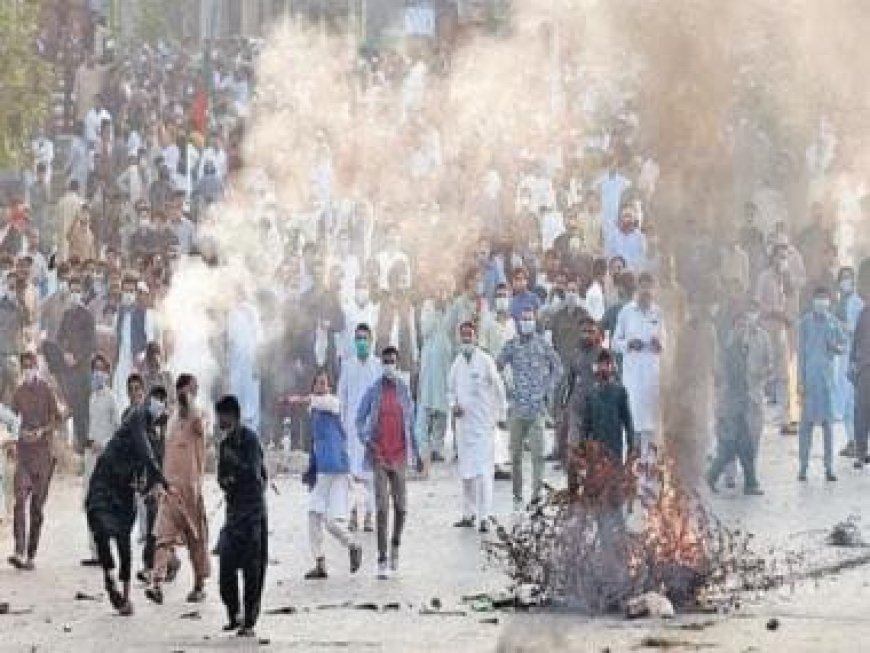Pakistan economy braces for big jolt as Imran Khan confronts military
Pakistan economy braces for big jolt as Imran Khan confronts military

Investors in Pakistan are preparing for a shock as former prime minister Imran Khan’s conflict with the government and the powerful military pushes the already tottering economy towards breaking point.
The Pakistani rupee is expected to fall by another 20%, according to some economists, who are raising alarms about a catastrophic plunge. Bond managers are facing the possibility of a sovereign default as a result of the heightened tensions following Imran Khan’s detention last week, which may make the $6.7 billion rescue offered by the International Monetary Fund (IMF) even more improbable.
Imran Khan, who was subsequently granted his parole by the supreme court, is criticising the military’s political involvement and calling for the holding of early elections. Investors are at risk as the unrest serves as a vivid reminder of the nation’s past, which includes three coups since 1958, and as an apparent assassination attempt on the 70-year-old lawmaker in November highlighted the possibility of increased violence.
“To be invested in Pakistan means you should be prepared for bigger risks,” Edwin Gutierrez, head of emerging-market sovereign debt at abrdn plc, was quoted as saying by Bloomberg.
“Black swans are a bigger probability,” he added.
If the country is unable to obtain IMF funds, Moody’s Investors Service warned this month that a default could occur after June. The business gave Pakistan’s sovereign credit rating a historic low downgrading in February. According to Columbia Threadneedle Investments, Pakistan’s external debt service is expected to be around $22 billion for fiscal year 2024, which starts in July. This amount is roughly five times the country’s foreign exchange reserves.
The extra yield that bond holders want to hold Pakistani dollar bonds over US treasuries has risen above 35 percentage points this month, which has alarmed bond investors. Dollar-denominated bonds issued by Pakistan are currently trading at distressed levels; 2031 notes are quoted at roughly 34 cents on the dollar.
The rupee dropped to a record-low 299 per dollar at week’s end, ending the day at 285.6. This year, the currency has lost roughly 20% of its value, ranking among the poorest performers globally.
After police encircled Khan’s home in Punjab province on Wednesday, sparking worries of a repetition of the violent riots last week, Khan said he fears another arrest. Authorities have already declared that they want to investigate his house for followers who may have attacked military installations during the turmoil.
“Any worsening of the political environment such as the imposition of martial law could deter the IMF,” said Patrick Curran, a senior economist at Tellimer based in Portland, Maine. “Default risk will continue to loom large and bonds and the currency will remain under pressure.”
If Pakistan cannot obtain the loan, the rupee might fall as low as 350 to the dollar in June, according to Adil Ghaffar, the chief executive of Premier Financial Services Pvt. in Karachi, who correctly predicted the rupee would fall to its present levels in January. Farooq Pasha, a Karachi-based economist, claims that Standard Chartered Plc is continuing to predict that the rupee will fall below 300 by the middle of the year.
“The rupee trajectory remains subject to considerable uncertainty as market sentiment is fragile,” Pasha said. “Politics will remain the key risk in the near-term until the elections.”
Despite severe limitations, Bloomberg Economics estimates that Pakistan’s dollar reserves, which were at $4.3 billion in mid-May, are not enough to finance even one month’s worth of imports. In January, import cover dropped to a historically low level of 0.5 months, according to Mumbai-based analyst Ankur Shukla. It has risen a little bit since the country obtained financing from China.
Stock selection in Pakistan is more important than ever, according to Johannes Loefstrand, portfolio manager of the frontier markets fund at T. Rowe Price in London. Systems Ltd., an information technology firm with a large portion of its revenue generated in foreign currencies, is a company in which the corporation has investments.
Since its independence from British rule 76 years ago, Pakistan’s military has long dominated the country’s political scene, actively governing for 32 of those years and supporting several of its civilian governments.
The last time a coup took place in South Asia was in 1999, when General Pervez Musharaff assumed control. Khan’s detention calls into question the army’s pledge to remain out of politics made last year. His leg was shot last year, but the military has denied any participation.
This year’s general election is scheduled for October. Khan demanded an early election and compelled the dissolution of two provincial assemblies to create momentum for it, but the administration is hesitant to move forward. Khan was emboldened by significant support in surveys.
IMF loan doubtful for Pakistan
Since November, Pakistan has been in talks with the IMF to restart its bailout programme. One of the main obstacles is the finance deficit. The $6.7 billion programme, which is set to end next month, has around $2.7 billion remaining to spend.
Pakistan has a troubled history with the IMF. The country has taken 13 bailouts since the late 1980s and with most of them remaining unfinished. A $1.1 billion loan was given to the government in August as a part of a package it obtained in 2019. But the programme has often been put on hold due to Islamabad’s refusal to uphold loan requirements and efforts to renegotiate terms.
Read all the Latest News, Trending News, Cricket News, Bollywood News,
India News and Entertainment News here. Follow us on Facebook, Twitter and Instagram.
What's Your Reaction?



























































